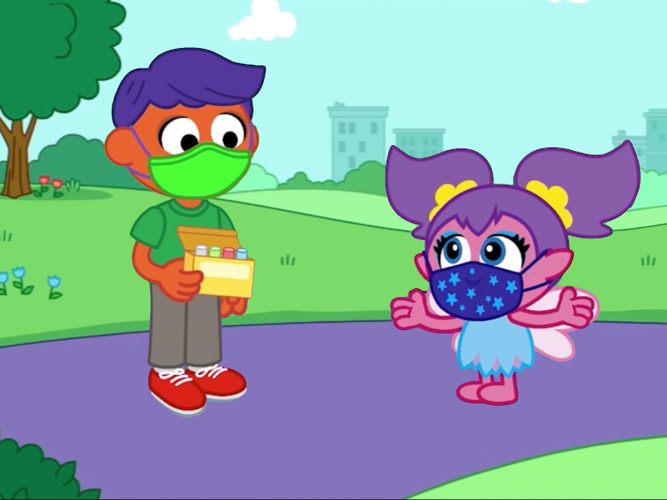
New Friendships: We’ve Been Waiting
A year is a long time in a child's life. Children need the support of the adults in their lives to help ease them back into familiar routines—and into friendships that have been restricted over the past year.
Figuring Out Friendships Again
With or without friends around, kids have continued to grow and change during this challenging year. It may have been a while since they have been able to spend time in person with their friends, and they’ve surely missed it. Even so, it will probably take time and patience—and maybe a little help from the adults in their lives—to reconnect in meaningful ways.
These resources will:
- Remind you that you and your family are not alone in the readjustments you face;
- suggest strategies for supporting your children as they reconnect to old friends; and
- offer activity ideas that give children the opportunity to practice their social skills.
We’ve been waiting a long, long time. At long last, it’s safer to start returning to familiar routines and spending time with friends and extended family. This has been an extraordinary year. It arrived with very little warning and no time to prepare. We’ve had to figure things out as we went along. Now, as we face a new chapter of the pandemic, we are suddenly navigating new challenges.
Take Your Time
Even if you’ve stayed in touch virtually, it’s going to take time to reconnect. Many things have changed: There may have been sicknesses and losses, insecurities, and just plain loneliness and worry. Depending on your family’s experiences during the past year, it may take a shorter or longer time to feel comfortable again. That’s okay—give yourself and your kids as much time as you need. Here are some suggestions that may be helpful:
- Make time to talk (and hug!). Encourage your kids to share their feelings and anxieties. Share your own, too. You can remind your kids that everyone, regardless of age, is in the same situation, and feeling some of the same worries.
- If your children seem nervous, you can pretend to be a friend, and act out some scenarios with them, practicing the words and phrases that might be needed: “How are you?” “What have you been up to?” “Do you want to go first?”
- Reassure them that things will feel okay, but that it will take a little practice remembering how to listen to friends, to take turns, to compromise. We’re all a little bit rusty when it comes to being with others! If possible, set up some activities for your kids that lend themselves to easing back into friendships: watching a movie with a friend, riding bikes, and so on.
- Re-establish routines and schedules as much as possible. And take your cues from your kids: Ease them back into their lives at a pace that they can handle. Children have different personalities, and these should be respected: Not every child will feel comfortable at the same speed.
- Look for extracurricular activities that your child might enjoy. Getting them together with others doing something they love–dancing, or music, or soccer, for example–may make it feel more natural to reconnect.
Look for Clues
- Watch your children for signs that they are having trouble. Keep an eye on sleeping and eating patterns, or changes in behavior: Big changes may indicate problems. Seek extra help if you need to.
- Remember that different children will have different emotional responses. A child who is naturally more anxious may have more worries getting accustomed to social situations again. There may also be separation anxieties. After all, young kids have been with their parents even more than usual.
A Learning Curve for Parents
Kids aren’t the only ones who are going to feel some hiccups. Parents and caregivers may have been on the job 24/7 this last year. It’s going to take some practice to adjust again to the idea of letting go, of letting kids make their own way, even if it means they will be making a few mistakes. You know your child best; you’ll sense when they need help. Be there when they need you, but step back when possible. You’ll discover that you’re putting your children in the best position to grow up confident and independent.

Friends: Old, New, and Kind of Oldish-Newish
A year is a long time in a child's life. Children need the support of the adults in their lives to help ease them back into familiar routines—and into friendships that have been restricted over the past year.

New Friendships
Children need the support of the adults in their lives to help ease them back into familiar routines.
